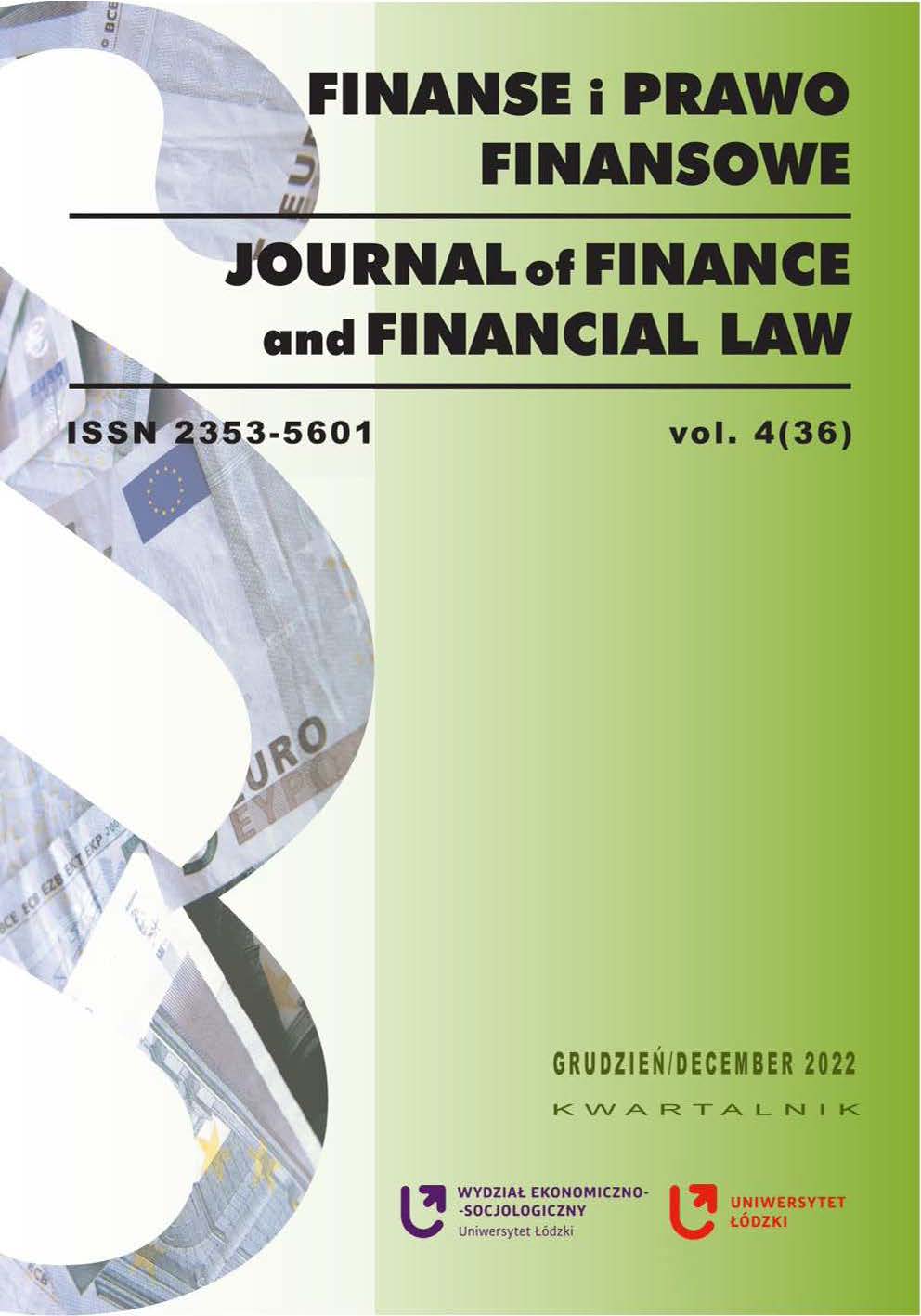The Blockade of Bank Account by the Use of Stir – Danger or Protection for Taxpayers in the Light of Sac’s Decisions
DOI:
https://doi.org/10.18778/2391-6478.4.36.06Keywords:
tax ordinance, STIR, blockade of bank account, combating tax frauds, security of taxpayersAbstract
The purpose of the article/hypothesis. The purpose of the paper is the evaluation of using STIR to blockade the bank account by tax administration. The research hypothesis is as follows: The blockade of the bank account by the use of STIR is abused by tax administration.
Methodology. The descriptive study including critical attitude to legal acts and literature was used as well as the case studies of SAC’s decisions were applied as scientific methods.
Results of the research. Tax frauds in VAT are an important problem of security of taxpayers. One instrument to combat them is the blockade of bank account by the use of STIR. Tax authorities very seldom use the blockade of bank account by the use of STIR. The analysis of SAC’s decisions shows that tax authorities do not abuse this instrument. The blockade of bank account by the use of STIR decreases tax frauds and increases the security of taxpayers.
Downloads
References
Babiarz, S. et al. (2019). Ordynacja podatkowa. Komentarz, wyd. XI. Lex, el. edition.
Google Scholar
Chądzyński, M. (2019). STIR się rozpędza. Gazeta Prawna, dated 11 March 2019, el. edition.
Google Scholar
Druk nr 1880 Rządowy projekt ustawy o zmianie ustaw w celu przeciwdziałania wykorzystywaniu sektora finansowego do wyłudzeń skarbowych. https://www.sejm.gov.pl/sejm8.nsf/druk.xsp?nr=1880 [Accessed 15.03.2022].
Google Scholar
Kwietko-Bębnowski, M. (2021). Blokada rachunku podmiotu kwalifikowanego – skalpel chirurga czy prymitywna maczuga? Przegląd Podatkowy, 6.
Google Scholar
Majkowski, W. and Wala, O. (2022). Sprawozdanie z XII Kongresu Podatków i Rachunkowości KPMG. Najnowsze trendy w kontrolach podatkowych (19 I 2022). Przegląd Podatkowy, 3.
Google Scholar
Markowić, V. (2014). Closing entrepreneurs by operation of law due to business account blockade. Pravo i privreda, 52.
Google Scholar
Matarewicz, J. (2021). 5. STiR a zasada proporcjonalności. In: I. Ożóg, ed., Karuzele i inne oszustwa podatkowe. Metody przeciwdziałania unikaniu opodatkowania. Warszawa: Wolters Kluwer Polska. https://sip.lex.pl/#/monograph/369477206/398226?tocHit=1 [Accessed 26.05.2022].
Google Scholar
Mikuła, P. (2018). System Teleinformatyczny Izby Rozliczeniowej – najważniejsze aspekty nowej regulacji. Przegląd Podatkowy, 2.
Google Scholar
Mileszyk, N., Paszcza, B. and Tarkowski, A. (2019). Zautomatyzowane podejmowanie decyzji w służbie społeczeństwu. Kraków, Warszawa: Fundacja Centrum Cyfrowe Klub Jagielloński.
Google Scholar
Mroziuk, M. and Zalewski, Ł. (2019). STIR: Rośnie liczba blokad rachunków. Podatnicy bez szans na realną obronę. Gazeta Prawna, dated 25 October 2019, el. edition.
Google Scholar
Pokojska, A. (2022). KAS chwali się skutecznością. Gazeta Prawna, 29 September 2022, el. edition.
Google Scholar
Pogroszewska, M. (2018). Fiskus blokuje konta z rozwagą. Rzeczpospolita, dated 5 November 2018, el. edition.
Google Scholar
Rudowski, J. (2018). Sądy liczą na rozsądek, wywiad przeprowadzony przez A. Tarka. Rzeczpospolita, dated 7 May 2018.
Google Scholar
Sarnowski, J. and Selera, P. (2020). Narzędzia informatyczne wykorzystywane w administracji skarbowej i ich wpływ na szczelność systemu podatkowego w Polsce w latach 2015–2019. Studia BAS, 4. https://doi.org/10.31268/StudiaBAS.2020.29
Google Scholar
DOI: https://doi.org/10.31268/StudiaBAS.2020.29
Szulc, M. (2019a). Coraz więcej blokad rachunków bankowych dzięki STIR. Gazeta Prawna, dated 3 July 2019, el. edition.
Google Scholar
Szulc, M. (2019b). STIR się rozpędza. Gazeta Prawna, dated 25 October 2019, el. edition.
Google Scholar
Szymanek, P. (2021). Sposoby bieżącego nadzoru nad podatnikami w podatkach dochodowych oraz podatku od towarów i usług (lata 1992–2021). Doradztwo Podatkowe – Biuletyn Instytutu Studiów Podatkowych, nr 12. https://doi.org/10.5604/01.3001.0015.6360
Google Scholar
DOI: https://doi.org/10.5604/01.3001.0015.6360
Szymczyk, P. and Szymański, W. (2022). Analiza i ocena regulacji uszczelniających w zakresie podatku od towarów i usług wdrożonych na przestrzeni ostatnich lat. Doradztwo Podatkowe – Biuletyn Instytutu Studiów Podatkowych, 3. https://doi.org/10.5604/01.3001.0015.8111
Google Scholar
DOI: https://doi.org/10.5604/01.3001.0015.8111
Tarka, A. (2018). Pochopna blokada wykończy firmy. Rzeczpospolita, dated 5 May 2018.
Google Scholar
Tarka, A. (2020). Skarbówka wygrała sprawę o przedłużenie blokady konta. Rzeczpospolita, dated 28 February 2020, el. edition.
Google Scholar
Tarka, A. (2022). Fiskus może blokować konta, ale z rozwagą. Rzeczpospolita, dated 14 March 2022.
Google Scholar
Ustawa z dnia 29 sierpnia 1997 r. Ordynacja podatkowa, Dz.U. 2021, poz. 1540, ze zm.
Google Scholar
Zalewski, D., ed. (2021). 3.5. Podstawowe pojęcia związane z wymierzaniem kary pieniężnej izbie rozliczeniowej. In: Kary pieniężne nakładane przez KAS i ich zaskarżanie. Warszawa: Wolters Kluwer Polska. https://sip.lex.pl/#/monograph/369483239/38?tocHit=1 [Accessed 26.05.2022].
Google Scholar
Downloads
Published
How to Cite
Issue
Section
License

This work is licensed under a Creative Commons Attribution-NonCommercial-NoDerivatives 4.0 International License.














